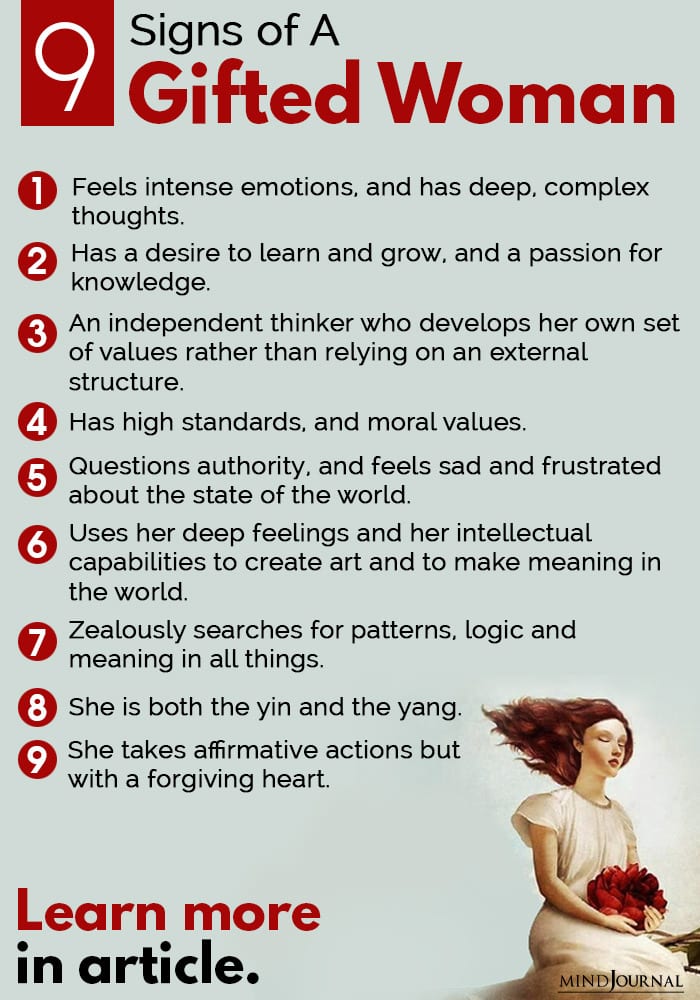Gifted women sometimes suffer more in society, despite being gifted. It’s like the best thing about them becomes their biggest and worst enemy. Now the question is, does it have to be?
Do you suffer from Imposter Syndrome?
Do you unconsciously push away success?
Are you being held back by conventional values, gender stereotypes, toxic envy, and attacks?
The Gifted Woman (9 Signs)

The gifted woman…
- – has complex and deep thoughts, and feels intense emotions.
- – has a desire to learn and grow, a passion for knowledge and a love for complex ideas.
- – zealously search for patterns, logic and meaning in all things.
- – is an independent thinker from a young age. She develops her own set of values rather than relying on an external structure.
- – has high standards, and hold herself and others up to high moral values.
- – questions authority, and sometimes feels sad and frustrated about the state of the world.
- – uses her deep feelings and her intellectual capabilities to create art and to make meaning in the world.
- – is both the yin and the yang. She is both purposeful and patient, both independent and cooperative, both adventurous and dependable, both courageous and tender.
- – holds the paradox between change and acceptance, she takes affirmative actions but with a forgiving heart.
Gifted people have traits that set them apart, and these traits may not be connected to intellectual intelligence, IQ, or the conventional idea of creativity and success. Having these traits mean they feel a deep sense of being different and isolated from a young age, and many have been misunderstood and pathologized. This is particularly true for gifted women, as many of them do not fit into society’s stereotypes and expectations.
(If you still cringe at the notion of the word ‘gifted’, it may be worth revisiting what I mean by that, and the ways your gifts may be manifesting themselves)
Related: 9 Signs You Are Dealing With An Unapologetically Powerful, Untouchable Woman
What Happened To The Gifted Girls?
Insecurities in talented females can be found at all age levels (Reis 1998). Numerous studies have found that as girls get older, their self-esteem drops:
- Girls who are as young as 6-8 lack confidence and expect to fail when compared to boys of the same age (Bardwick, 1972).
- Most girls remain enthusiastic and assertive at ages 8 and 9, but lose confidence in their abilities at ages 13 and 14 and emerge from high school with measurably lowered goals.
- The decrease in girls’ self-esteem is three times greater than boys (AAUW, 1991).
- The same happens in college years:
- Female graduates who attended a school for gifted students did not believe in their superior intelligence (Walker, Reis, & Leonard, 1992).
- A study found as female valedictorians got older, they show more doubts about their own abilities, despite receiving higher grades throughout college (Arnold, 1995).
And in the workplace:
• As compared to their male counterpart, gifted women express more doubt about their abilities, compare and criticize themselves more.

External Barriers For The Gifted Women
Barriers to gifted women achieving their full potential are both external and internal— societal and psychological. Societal factors include conscious and unconscious discrimination, sexism, lack of structural support and resources. Though the picture has changed tremendously in the last two decades, many of these factors still linger.
According to the World Economic Forum’s Global Gender Gap Report in 2016, the global gender gap across health, education, economic opportunity, and politics has closed only by 4 percent in the past ten years. Women around the world on average are earning just over half of what men earn despite working longer hours.
Only four countries in the world have equal numbers of male and female legislators, senior officials, and managers, despite the fact that 95 countries now have as many – if not more – women educated at the university level.
The reality is that from a young age, the gifted females face conflicts between their own abilities, drive, and aspirations and the stereotypes and social structure of the world:
- Studies found the contents and furnishings of girls’ and boys’ rooms to be drastically different, with girls’ rooms having more dolls and dollhouses and boys’ rooms having more educational and art materials, and machines (Rheingold & Cook, 1975; Pomerleau, Bolduc, & Malcuit, 1990).
- Further studies showed that gender stereotyping in toys contributes to lower math and science scores for adolescent girls on achievement tests (Yee & Eccles, 1988; Lummis & Stevenson, 1990; Olszewski-Kubilius, Kulieke, Shaw, Willis, & Krasney, 1990).
- Up to this day, the media, children’s literature, TV shows, educational materials all present more men than women (Sadker & Sadker, 1994; Reis, 1998), and when women are presented, their appearances, rather than their talents, character, or value systems are highlighted.
- Parents want their daughters to show “appropriate” and even demure behaviours. Many expect their daughters to be polite, well mannered, and congenial (Reis, 1998).
- Within a family, the girl is identified as “the sensitive one” in contrast to a (male) sibling, who is often “the intelligent one” (Barbara Kerr).
- When a man is unmarried, he is called a bachelor. If a woman is unmarried, she is called a spinster or an old maid. There is something about a successful, unmarried woman that poses a threat to the patriarchal order of our society (Marianne Williamson).
Related: 6 Ways To Stop Hating Women
Psychological Blockages Faced By The Gifted Women
The external inequality has an internal effect, shaping how we think, feel, and see as possible for ourselves. With all the gender stereotyping and hidden sexism, many women have internalized these oppressive values.
This results in behaviors such as people-pleasing, conflict avoidance, hiding, and shrinking. An essential step in your path towards reaching your full potential is to become aware of these psychological blockages and to work through them.
1. The Imposter Syndrome
Imposter Syndrome is defined as the tendency to doubt and discredit one’s abilities and achievements (Bell, 1990), and is especially prevalent amongst gifted women. Research into the impostor syndrome began in 1978 when researchers Clance and Imes observed how women with notable achievements also tend to have high levels of self-doubt and are unable to internalize their own success.
Instead of celebrating their achievements, they have the feeling of being a failure, a fraud, or an impostor.
In contrast to how males tend to attribute their achievements to their own abilities, women attribute their accomplishments to external factors such as luck and external help. Because gifted women are naturally more capable than their peers, they sometimes achieve a great deal without much effort, which results in them assuming that they had somehow slipped through the system undetected as fakes. They believe that they are just ‘lucky’, that it is others rather than them who are truly gifted.
As a result of the imposter syndrome, many gifted women live in the constant fear of being ‘found out’. They would rather “play safe” and avoid exposure to competitiveness and intellectual challenge, thus holding themselves back from their full potentials.
2. The Fear Of Success Syndrome
Without realizing it, many women have a fear of success. Either by nature or nurture, they tend to value relationships and take others’ perspectives into account. Many see being called “gifted” as an uncomfortable burden, as it reinforces the fear of not belonging or offending others.
The tendency to hide can be found amongst gifted girls early in life: Buescher and his associates (1987) found that as compared to only 15% of boys doing so, 65% of girls consistently hide their abilities in school, as they do not want to be considered different from their peers (Reis 1998).
As a result of society’s pressure and what it says one ‘should’ and ‘shouldn’t’ do, the capable young women change their plans to accommodate a less ambitious, more traditionally feminine role.
Tara Mohr in her book Playing Big talks about the ‘good girl conditioning’ that is prevalent in our culture and the way girls are brought up: Be nice, be considerate, likable, and never rock the boat. Be modest and solicitous at all costs. Under such conditioning, the withdrawal of others’ praise becomes a threatening idea.
In dating situations, they may have been criticized, either subtly or overtly, for not behaving in “the way women are supposed to be”. They may subconsciously hold themselves back because they are worried that they will appear undesirable to the opposite sex if they are too competent or successful.
Studies show that gifted women have a stronger need to please others than the average women do. Their fears tend to increase as they approach achievement and success because of the anticipated consequences.
Even when a gifted woman sees that it is irrational to underachieve, she may continue to do so if deep down she believes that success will result in a failure in the realm of relationship and intimacy.
Related: 4 Things Women Don’t Owe You
3. Sensitivity To Social Dynamic
The Fear of Success is exemplified by the sensitive woman’s ability to pick up the most subtle cues in any given social situation. Since she is astute, she can clearly see and feel the social dynamic of competitive situations much earlier than average girls do.
Many gifted women are constantly on the receiving end of toxic envy— both from men and, sadly, most other women. In workplaces, social reactions toward women who stand out are often demeaning and hostile. In order to survive socially, they hide their capabilities in order to not to be seen as a threat to others.
As the gifted director, Ida Lupino did: “Men hate bossy women. Sometimes I pretend to know less than I do.”
Even on a conscious level, the gifted woman disagrees with hiding and shrinking herself, on a subconscious level, the young girl who wished to be picked in the playground, who has a deep yearning to belong, may still be running the show and sabotage her success in life. The biggest tragedy is that the gifted woman who pretends to be less capable eventually forgets about her true potential and disappears into the crowd.
4. Believing That They Can Only Be One But Not Both
Historically, women are given the role of a nurturer, whose main task is to be the homemaker and to build relationships. According to researcher Gilligan (1982), many women’s sense of integrity is entwined with ‘an ethic of care’, which means they define themselves in a context of human relationships, and judge themselves in terms of their ability to care for others.
Whilst this is a valuable quality, it is distorting to only evaluate a woman’s worth based on a one-dimensional metric.
The ethic of care most affects gifted females who have relationship/ family obligations but also have their own unique dreams and aspirations (Reis, 1998). The research found many gifted women from the age of early twenties to late forties express feeling guilt over doing what they want for themselves.
Unfortunately many cultures still pressure women to choose between work and marriage. Especially in many collectivist and Asian cultures, they are pressured to prioritize ‘relationship life tasks’ such as marriage and are left with little time and energy for their own creative work.
Despite societal changes, they still feel that they have to choose between relationships and their own aspirations— that they weren’t allowed to be both. They can be either competent or nurturing, but she can’t be whole and integrated.
Related: 12 Traits of An Unforgettable Woman
Unique Challenges For The Gifted
The above psychological barriers are compounded with the challenges inherent in the trajectory of simply being gifted and intense. The gifted women face specific complexes and issues on their path:
1. Acknowledging and working with multipotentiality. Multipotentialites are those who have multiple interests, pursuits, and abilities in life. You may not have ‘one true calling’ the way specialists do. You may be equally talented across many diverse subject areas or have multiple career aspirations or achievements. (For more on this concept, I would refer you to the brilliant work of Emilie Wapnick. You can watch her Ted talk here.
2. The angst and restlessness caused by seeing the gap between where you are and where you want to be, between your current predicaments and your vision. This can be painful, but such inner conflict is not pathological, but the impetus for growth and development.
3. Finding the right mentor: Because of your high level of intensity and sensitivity, you might have been misunderstood or misdiagnosed by teachers, therapists, or other authority figures but have no knowledge of your unique and complex nature.
4. Managing your energy levels, channeling and focusing your emotional, intellectual and physical intensities. Reaching the ‘flow state’ in order to maximize productivity.
5. Healing from the developmental trauma that comes from being different whilst growing up, and the loneliness of never feeling belonged.
6. Managing expectations from others, contributing to the world without being taken advantage of. Setting healthy boundaries at home and at work.
7. Defusing toxic envy, resentment, schadenfreude, and attacks from others. Not only your peers, but your bosses, managers, and superiors may feel threatened by you. You may also have novel approaches to things that others are not ready to hear or work for, thus attracting rejection and resentment.
Related: 7 Ways An Alpha Woman Stands Out From The Rest
The World Needs You To Be You
The world desperately needs you to step up. Not only that hiding and shrinking would make you feel sick and congested, you playing small does not serve the world. Being gifted doesn’t make you arrogant. It simply means that you are different.
It is neither positive nor negative, and it does not make life any easier than others. After all, when you are given the capacities, you are also given the responsibility to manifest them.
Power is strength and the ability to see yourself through your own eyes and not the eyes of another. If a person has power, as women do, and she doesn’t use it, power will sit within her and have no place to focus. It is then that power becomes twisted and evil. It can turn against the person who has called it. (Flight of the Seventh Moon, 1984)
The eminent women had a sense of individuality in their lifestyles. They chose partners who value their goals and see them as equals. They combine their career and family- if they want one, conventional or unconventional – in creative ways. They have all fallen in love with an idea.
Researcher Barbara Kerr has identified key themes in the lives of eminent women that have contributed to their achievements:
- Voracious reading and learning.
- Ability to be alone.
- Willingness to be different.
- A corresponding acceptance of being special.
- High aspirations.
‘Most of these women who fell in love with an idea and through their passion, emotional intensity, excitability, and high energy levels were able to succeed at what they loved to do while enduring adversity and overcoming obstacles set in their path.’ – Leonie Kronberg, in her study of Australian eminent women
In order to step onto the path of becoming eminent, we need to address and work through the various external and internal barriers that have held gifted women back. The truth is, the world has been deprived of the talent and creativity of half its population for far too long.
Young girls need their role models to step up and show them the way. You cannot make changes- inside and outside of you- without stepping up to your full capacity.
Written By Imi Lo Originally Appeared In Eggshell Therapy










Leave a Reply